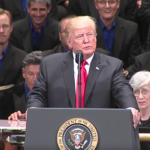Using the yardstick of 30 years per generation, it may be that we’re coming to the end of a generation in which political power was the primary preoccupation of American Christians.
I’m dating that from the birth of the Moral Majority in 1979, which led to other conservative power structures over the rest of the 20th century, such as the Christian Coalition in 1987.
I am not mocking these groups, tearing them down or questioning their motives.
I am willing to believe Jerry Falwell, Pat Robertson, Ralph Reed and others had a beautiful objective in mind when, grieved by the moral decay of the day, they led millions of Christians in a crusade to storm Washington and “take back our country.”
I think they were patriotic. I think they were devout. I think they were right that America needed God much more than America thought it did.
And I’m not saying Christians should be sequestered or cloistered or closeted away from the rest of society. Political involvement is part of being a good citizen in a democracy, and Christians are called to be good citizens.
As the Apostle Paul preaches to the Roman church, whatever the government wants from you is what you ought to give it. “If you owe taxes, pay taxes; if revenue, then revenue; if respect, then respect; if honor, then honor,” Paul writes. And if the government wants to you to be an informed voter, then pull that lever.
But as I look at how the relationship between our nation and Christianity has grown and evolved in 30 years, I can’t help but wonder where we would be today if this had been a different kind of generation.
What if patriotic, fundamentalist leaders had looked at the situation 30 years ago and come up with a different answer to the question of what Christians could do to help steer America? What if all of the head-scratching and caucusing and prayer meetings had not led them to fight for political recognition and power? What if they had determined that what the republic needed to stand into the 21st century was simply love?
Sign up for our weekly edition and get all our headlines in your inbox on Thursdays
Hey, it could have happened. Humor me. Maybe they all took a break and went to see Back to the Future together in 1985 and were inspired by the soundtrack song “The Power of Love” by Huey Lewis and the News.
Maybe they decided to put that power to the test.
My guess is that those leaders would have felt silly offering such a naive strategy to resist the rising tide of abortion, drugs, homosexuality, broken homes, greed, social entitlements, secular humanism and other stuff they all preached so many sermons against. Love doesn’t sound like you’re putting up a fight. Love doesn’t sound politically savvy. Love doesn’t sound like it has much direct-mail fund-raising power.
But how would the past 30 years have played out, and where would our nation be now, if millions of Christians had been mobilized and inspired to do nothing more than pour massive doses of gentle but unrelenting love on the people who needed it?
Gentle love for teenage girls who got pregnant.
Gentle love for the ones who kept the babies and turned into single mothers.
Gentle love for the ones who had abortions.
Gentle love for families on welfare.
Gentle love for addicts.
Gentle love for the homeless.
Gentle love for public school teachers who couldn’t lead their classes in prayer.
Gentle love for AIDS victims and for their lovers.
Gentle love for illegal immigrants.
Gentle love for hawks and for doves.
What would this past generation have accomplished if their leaders had chosen the open, outstretched hand of love instead of the raised fist of political clout?
Would Christians be more admired by our fellow citizens than today’s polls tell us we are? Would we have made more progress in changing this nation?
More importantly, where will America be in 2038 if today millions of Christian men and women dedicate themselves to being a generation of love, helping their nation in a way only they can?
Let’s put it to the test.
Doug Mendenhall, author of How Jesus Ended up in the Food Court, is a columnist for the Huntsville Times in Huntsville, Ala. His column is distributed by Religion News Service.














We seek to connect God’s story and God’s people around the world. To learn more about God’s story, click here.
Send comments and feedback to Eric Black, our editor. For comments to be published, please specify “letter to the editor.” Maximum length for publication is 300 words.